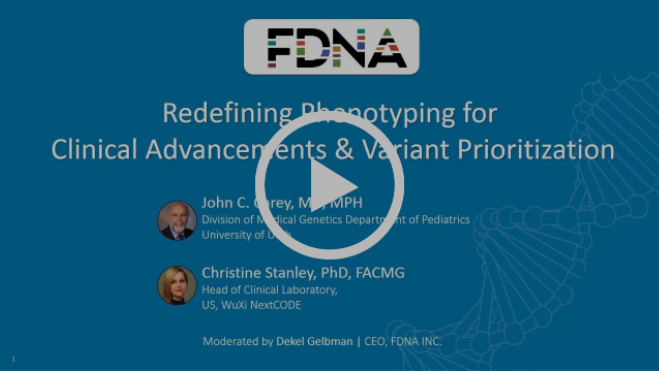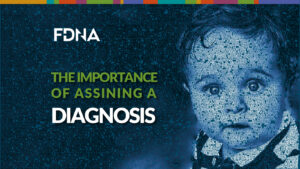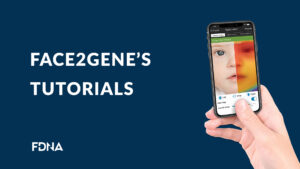FDNA’s CEO, Dekel Gelbman, joined two distinguished members of the genetics community—Dr. John Carey (University of Utah) and Dr. Christine Stanley (WuXi NextCODE)—on redefining phenotyping for clinical advancements and variant prioritization.
Dr. Carey. a highly-practiced clinician, currently at the University of Utah’s Department of Medical Genetics, kicked off the webinar with a comprehensive background on phenotyping, including a discussion of the important role phenotyping plays in the process of diagnosing a patient.
Dr. Carey noted colleagues’ worries that there would be a decline of phenotypic analysis as next-generation sequencing (NGS) rises in popularity and accessibility, but went on to agree with the sentiments from a 2012 paper by Hennekam & Bisecker that, in fact, this new era of genome sequencing has led us to enter a “new epoch of phenotyping.” Rather than replacing the need for phenotyping, NGS has instead led to a new way of phenotyping.
Over the last few years, Dr. Carey noted there has been a “proliferation of resources which speaks to this notion of deep phenotyping.” Among such resources is FDNA’s Face2Gene technology. Using case studies as examples, Dr. Carey demonstrates the benefit Face2Gene can play in picking up on subtle facial patterns and, in turn, deciding on testing.
“We [clinicians] would benefit by having expanded knowledge and tools truly at our fingertips, but there is no question that the patients will benefit with the increased chance of making a diagnosis, or at least helping us in our genome analyses”
Dr. Stanley built on this point by sharing insights into the importance of phenotyping from a lab perspective. Drawing on her extensive background, most recently as the Head of Clinical Labs, US at WuXi NextCODE, Dr. Stanley was able to provide a thorough look into what exactly is required for a successful genetic test. Previously, phenotypic information was not required when ordering testing, but now, “the justification for testing is dependent on a complete and accurate clinical intake.”
According to Dr. Stanley, the clinical phenotype is very important as a line of evidence in variant classification. She goes on to say that “the more limited the phenotype, the greater the risk the disease causing variant will be filtered out of the data set.” In order to avoid the accidental omittance of the causal variant from the report, Dr. Stanley suggests increasing the use of the PP4 line of evidence—which is associated with the patient phenotype—in testing, possibly by way of tools that help to incorporate phenotypic information into clinical reports.
“The phenotypic information combined with the gene sequence information is a powerful combination.”
According to Dr. Stanley, with the use of FDNA’s Face2Gene technology, a “dynamic feedback loop of clinical symptoms & genomic information can be achieved,” which leads to improved variant prioritization and speedier diagnosis. Ultimately, Dr. Stanley summarized that “phenotyping is critical for diagnostics and diagnostics are critical for patient management.”
“Every aspect of healthcare can be impacted by understanding the phenotype.”
Listen in as Dr. Carey and Dr. Stanley share their respective clinical and lab perspectives about genomic medicine and NGS ushering in a new era of phenotyping.
Continue the Discussion With These Thought Leadership Talks at ACMG
Visit FDNA (Booth #1015) to learn more
Delineating Genetic Syndromes and Next-Generation Phenotyping
John C. Carey, MD, MPH
Professor, Department of Pediatrics, University of Utah
Emeritus Editor in Chief, American Journal of Medical Genetics
Thursday, 4/12 10:15AM
Face2Gene RESEARCH for Deep Phenotyping of Novel Syndromes
Karen Gripp, MD
Chief, Division of Medical Genetics, A.I. DuPont Hospital for Children
Thursday, 4/12 11:30AM
Face2Gene LABS at WuXi NextCODE: Phenotyping for Improved Variant Prioritization
Christine Stanley, PhD, FACMG
Head of Clinical Laboratory, US, WuXi NextCODE
Medical Director, QNA Diagnostics
Thursday, 4/12 3:45PM
Next-Generation Phenotyping in the Era of Next-Generation Sequencing
Dekel Gelbman
Chief Executive Officer, FDNA
Friday, 4/13 10:15AM



